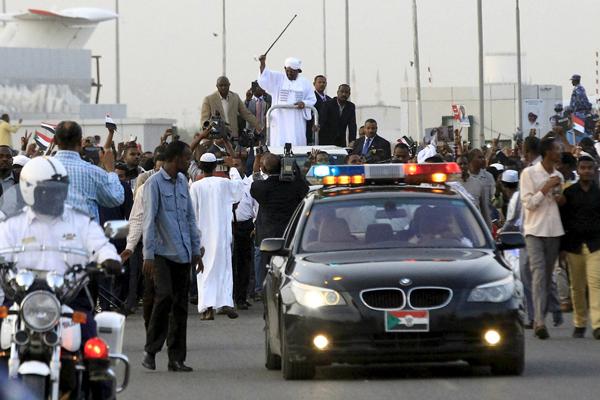PBS: Escaping Eritrea … [Read More...] about ካብ ውሽጢ ቤት ማእሰርታት ኤርትራ
Al-Bashir’s breakout
What are the implications of Sudanese President Omar Hassan Al-Bashir’s flying out of South Africa in defiance of an arrest warrant from the International Criminal Court, asks Gamal Nkrumah
Sudanese President Omar Hassan Al-Bashir left South Africa on Monday afternoon aboard his presidential jet from a military airport on the outskirts of the capital Pretoria, arriving amid much pomp and ceremony in the Sudanese capital Khartoum a few hours later much to the consternation of the International Criminal Court (ICC) in The Hague which had issued a warrant for his arrest on charges of crimes against humanity.

The ostrich defence mounted by the African Union (AU) and South Africa in letting the Sudanese president leave the country after an AU summit meeting raised eyebrows in Western circles and its repercussions will be legion.
“The government’s failure to arrest Al-Bashir is inconsistent with the [South African] constitution,” judge Dunstan Mlambo of South Africa’s High Court said. A South African court, without much clout it appears, had earlier barred Al-Bashir from leaving South Africa in accordance with the ICC warrant, but to no avail.
While legal experts and compliance officers cringe at Al-Bashir’s apparent immunity, Sudan’s Foreign Minister Ibrahim Ghandour trumpeted at Khartoum International Airport soon after the Sudanese president’s arrival that “the International Criminal Court has been totally destroyed in Africa.”
Ghandour, appointed earlier this month, is fond of a punchy catchphrase to express a political stance. Al-Bashir has four presidential assistants, Ibrahim Mohamed Hamed, Khalil Youssef Al-Dagayr, Moussa Mohamed Ahmed, and the son of opposition leader and former prime minister Sadig Al-Mahdi who was overthrown in a coup d’etat by Al-Bashir in 1989, Abdel-Rahman Al-Sadig Al-Mahdi. These appointments, coupled with Al-Bashir’s latest escapade, are indicative of his political acumen.
The repercussions of Al-Bashir’s breakout from South Africa are debatable. The tacit complicity of the South African authorities reflects the fact that the majority of African nations are fed up with the ICC’s hounding African leaders. Over a broad band of policy the collusion of African nations with Al-Bashir is eyed with suspicion in Western capitals.
The bizarre ways of Al-Bashir pinpoint his prowess at home. He is a proficient politician, and though no democrat he has long managed to keep the opposition at bay. No one doubts the Sudanese public’s disquiet at the president’s antics, nor the unease in other African nations over the impunity with which Al-Bashir defies the West. Nevertheless, the AU has campaigned consistently against the ICC and contends that no sitting head of state should be prosecuted by the court.
South Africa is no exception to this rule, and Kenya and Nigeria have both earlier feted Al-Bashir and have permitted him to depart in peace. Al-Bashir had arrived late in Johannesburg for the AU Summit on Saturday, but cut short his visit before the South African court had pronounced its verdict on whether he would be allowed to leave.
Needless to say, the South African government’s decision to grant immunity to visiting heads of state threatened by court action has shed light on the dynamics of African politics. Solidarity among African nations and an increasing awareness that they must act as one in the international arena has come into play.
South Africa’s views are shared across the African continent, even though some South African civil rights groups have maintained that the South African government ignored international and national laws that oblige it to detain Al-Bashir.
Two points seem salient. First, the era that bound African nations to scrupulously comply with international law is over. No African nation is forced to hand over a fugitive leader such as Al-Bashir as long as he is the acknowledged to be the ruler in his own country. He is free to go wherever he wants in Africa.
On Tuesday, the ICC gave the South African seven days to account for having permitted to let Al-Bashir go free. Whether South Africa, an ICC member state would comply is as Al-Ahram Weekly went to press, open to question.
Second, in principle there must be a balancing of the political cost of defying international law. But in practice this is not the case, and the global political challenge is profoundly different from what it was a generation ago.
The political capital that would need to be expended in bringing Al-Bashir to book is simply not worth it. But there should be careful consideration of the ramifications of the South African government’s decision to let Al-Bashir fly home in spite of his being indicted by the ICC on serious criminal charges including crimes against humanity and genocide in Darfur.
Ultimately, diplomacy must be one component of a broader approach to international law. The deafening noise of Western protest against the actions of African governments is inadmissible in contemporary Africa. It must be stressed that African nations are not the only states that flaunt international law.
